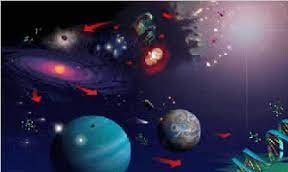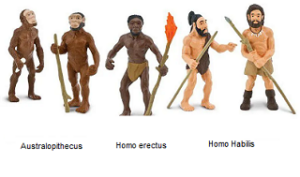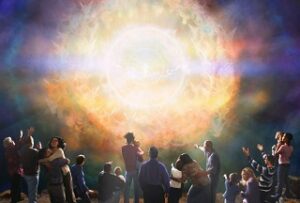
Arquivo para a ‘’ Categoria
The cosmos and divine wrath
The rational / idealistic universe model was of a cosmos working like a clock, reality and the cosmos showed themselves beyond the idea of the modern ones (the Greek eidos is something else), it showed itself as a quantum model where there is a third included (model Barsarab / Lupasco) and in which time and space are no longer absolute and matter is energy.
like a clock, reality and the cosmos showed themselves beyond the idea of the modern ones (the Greek eidos is something else), it showed itself as a quantum model where there is a third included (model Barsarab / Lupasco) and in which time and space are no longer absolute and matter is energy.
Thus, the old harmony model was modified by current physics, called Standard Model Physics which, from particle physics, developed a unified model for the forces acting on matter, including the strong, weak and electromagnetic and gravitational forces unifying them quantum field theory, quantum mechanics and special relativity.
The recent discovery of the Higgs Boson, incorrectly named the God particle assuming that it would be responsible for attributing matter to bodies, this model explained the magnetic attraction of planets, light and the various forms and divided matter into many particles.
After the creation of the universe and its expansion certain laws developed bodies, planets and planetary systems in formation and decline, current studies show the development of stars comes from interstellar gas and cosmic dust and hydrogen that at low temperatures collapse and form molecules that give protostars, these under pressure and rotation form the stars.
In addition to our knowledge, this expanding universe acts in an often surprising way and today we know that not only what happens on the planet has internal but also external influences, solar flares and the approach of celestial bodies for example, in short we are a tiny grain of sand in a much more complex and wandering universe.
This entire celestial body acts with its own harmony and not necessarily as the current laws that we know are thought, so a surprise is always possible, for example, today we are looking for the ninth planet (Pluto was demoted to a dwarf planet) that would have an orbit external to the our planetary system and would now be approaching the system, affecting for example the Kuiper Belt, and would have a translational orbit of 14,000 years and there would be other outer bodies of the Solar System.
Within this new logic of the universe, aorganic movements (from the inorganic to organic life) are not only possible but easily explainable, the environment around the biosphere is a living organism and it is within a larger universe and subject to its laws.
What happens in the human sphere also has its unstable and unbalanced balances, so it is no longer possible to think of everything as a “harmony”, in the Cartesian sense, but as what tends to favor the functioning of the universe as a whole and for the which forces tend to push before their own laws and determinations in human eyes may be divine wrath, or “perfect divine harmony”, but different from that explained as a clock movement.
So it is not a Kronos, but a Kairós, “opportune moment” or “right” in the divine perspective in which everything that is at odds collapses and that in human eyes is “wrath of God”, when in reality it is a correction of cosmos governed by its own laws.
Wanting to heal to a new normal
Carnival would start today in Brazil, there are those who regr et this impossibility even thinking about a pandemic that shows no signs of weakening, even countries that are advancing with the vaccine, as in the case of Portugal, England and the United States the signs that the virus circulates are still strong.
et this impossibility even thinking about a pandemic that shows no signs of weakening, even countries that are advancing with the vaccine, as in the case of Portugal, England and the United States the signs that the virus circulates are still strong.
Morin’s book alerts us to lessons that the pandemic should have taught us, but it is not what is actually observed, so not only do we need other “cures” like human fragility itself in the face of the virus and other pathologies, including social ones, can remain.
It is necessary to want to heal and we discover that this cure is collective and codependent, we need everyone to be healthy and a society that does not look at the most fragile or that despises them and condemns the life of loneliness and death has not yet achieved a lasting cure that point to lasting solidarity.
We learned the harshness of isolation and loneliness, even if in family, but how many people live like this in the so-called normality, that the new normal brings a greater human aggregation to all, that traces what Edgar Morin calls a new humanity more humane.
May the vaccine immunize us, but let us learn co-immunity as Peter Sloterdijk advocated even before the epidemic, and it did not refer to the immunity of the disease, but in a broader sense that immunity that makes us a humanity capable of defending itself against tyrannies and social diseases.
The biblical passage in which a leper approaches Jesus and asks on his knees: “If you want, you have the power to heal yourself”, Jesus, compassionately reached out, touched him and said: “I want you to be healed!” (Mark 1: 40-41).
There are two essential points: the leper’s burning desire with faith to heal and divine compassion for him to be healed, human faith and righteousness attract divine power, those who believe know this.
People today want to change to a new normal or remain frivolous normal life.
Collaboration and ingratitude
Seemingly so distant terms are deeply connected, collaboration that almost always involves a dose of gratuitousness (may even be paid, but does it with some generosity), and the ingratitude, which is not acknowledging the gratitude, of what is done. with some donation dose. Even in pandemic period, there is little gratitude.
that almost always involves a dose of gratuitousness (may even be paid, but does it with some generosity), and the ingratitude, which is not acknowledging the gratitude, of what is done. with some donation dose. Even in pandemic period, there is little gratitude.
This always involves the means of power, in times of psycho-power, the choice of means for certain ends is fundamental, what the individual influences or challenges for his own benefit, is explained in Habermas using the concept of Hanna Arendt and polemizing with Max. Weber: “It is this capacity for disposition over means that enables one to influence the will of others that Max Weber calls power. H. Arendt reserves for this case the concept of violence ” (Habermas, 1980: 100).
Thus, it can be theorized that what does not lead to collaboration can lead to a form of power or violence, if we admit that collaboration has an essential opposition to ingratitude, or to even theorize, a dose of ingratitude.
Still in the field of theorizing, in phenomenological life I think that “means” have accelerated the idea of collaboration, Habermas will speak of a “methodological individualism” applying it to forms of power that do not allow “mutual understanding” or overcoming ” egoic sense of power ”, which leads to non-collaboration and non-recognition of gratuitousness.
I think Hanna Arendt is more straightforward because her model is “a communicative model” (interactive) where consensus would be reached by non-coercive means, by “reciprocal understanding” that would lead to “common will”, in my view, is still lacking, idea of gratitude.
In environments where collaboration and reciprocity, mutual actions of co-working, that is, working together, is already a reality, power is dispersed and the leader does not appear as coercive, Latin coercive power, meaning retention.
What is proposed then, starting from Hanna Arendt is to think of the way that allows collaboration as a communicative way of influencing the will of the other without coercing it, this leads to systems of ingratitude, misunderstanding and power struggle through of violence.
Habermas, J. (1980). A crise da legitimação do capitalismo tardio. (The crisis of legitimation of late capitalismo). Rio de Janeiro, Tempo Brasileiro.
The desired and not built peace
 We know that the “pax romana” was the surrender to the empire that dominated the good face of the civilized world at the time, it is true today that there were already people in various parts of the planet, but their paleontological records do not leave many marks of their cultures, and perhaps as Rousseau thought ‘the good savage’ lived in peace, but in the natural conflict with nature.
We know that the “pax romana” was the surrender to the empire that dominated the good face of the civilized world at the time, it is true today that there were already people in various parts of the planet, but their paleontological records do not leave many marks of their cultures, and perhaps as Rousseau thought ‘the good savage’ lived in peace, but in the natural conflict with nature.
The “eternal peace” elaborated by the idealists and idolized by the worshipers of the “modern state” is not deepened, because in fact for many this will be the state, excuse the final irony of humanity and should only be perfected. Kant published in 1798, in a Berlin magazine, the essay “Announcement of the forthcoming signing of a treaty for perpetual peace in philosophy”, which was a resumption of his essay two years earlier: “For perpetual peace”, that was confined in its philosophy.
This is because the goal was to resolve peace within a single state, or in terms of relations between different states, which we can see even with the emergence of the UN and the rise of democratic nations, which in essence the idea of state remains enlightened. .
From this essay it can be assumed that what the philosopher understood by philosophy means that if systems of philosophy found a solution to their conflicts they could help political systems to resolve their conflicts, so it remains in the idealistic field.
The conflict between object and subject, which supposes that it is in the object that is the conflict and not in the subject is the hypothesis of the idealism/enlightenment system, but it is in the facticity of the historical subjects that the conflicts are, I do not understand as the historicity romantic because facticity is the Heideggerian concept of the subject thrown into the world with his facts.
Thus, what is meant by peace beyond idealism is that which can be built on the facticity of everyday life, in every conflict encountered in every fact, without being confined to theoretical or philosophical assumptions, but where the “being thrown” is. in the world”.
Peace, therefore, is built and not an agreement between states or within them, the peace treaty of the 1st. world war led to the second, some readers of world history say, the fact is that there were two wars and the “modern” states not only did not avoid, but are authors. “If you want peace, build peace,” said an Italian politician, very few understanding this.
A post-pandemic will be problematic, it may even lead to a civilizational crisis, where many measures should be taken from now on.
For a spiritual ascesis
What we see beyond the crisis and cultural night, beyond a deep social crisis without a thought that catalyses the real forces of society that point to the future, is also a night of God, educator Martin Buber describes it as God’s Eclipse.
beyond a deep social crisis without a thought that catalyses the real forces of society that point to the future, is also a night of God, educator Martin Buber describes it as God’s Eclipse.
Buber wrote in his book: “I later built for myself the meaning of the word ‘mismatch’, through which was roughly described the failure of a true encounter between human beings. When, after another 20 years, I saw my mother, who had come to visit me, my wife, and my children from afar, I couldn’t look into her still astonishingly beautiful eyes without hearing the word “mismatch” somewhere as if it were. tell me.
I suppose that everything I have experienced over the course of my life about the authentic encounter has its first origin at that time in the gallery. ”(BUBER, 1991, p. 8). Thus revealing the true face of the “silence of God” of Judaism in which it has its roots, will be in another book the “I-Thou” where he will reveal an aspect of his asceticism which is “the encounter with the Other”, which for Buber more. than one person, your Tu has a divine essence, God inhabits the other.
These days there are two strong tendencies, and in both asceses there is in fact no spirituality beyond transcendence, or the activism that Byung Chul condemns as the “active vita” that leads to tiredness, or the idealistic subjectivism that can It seems to be religion but it is not, what it arouses is nothing but sentimentality, and can lead to “faithful” tears, not necessarily to God, if they do discover Him they must seek another true asceticism.
Thus it is possible that they will find God in one way or another, but there is no other way to remain in the faith, not of the blind but of those who have found a clearing, if indeed meditation and prayer are to remain, they are indispensable.
For those who have no faith, a good reading, separating passages and thoughts, living the moment as we wrote in the previous post, is fundamental, that is, also for reading can follow the rule of doing it without “gluttony”, try put the soul in silence, making a true “epoché”.
To those who believe always reflect that Jesus prayed, and asked his disciples to pray with him, and not to lose this practice, Jesus will tell the parable of the bad judge who does not want to attend the widow, but by his insistence and so that she does not. he curses, he answers, says the opening passage: “Jesus told the disciples a parable to show them the need to pray always, and never give up…”, which is in Luke 18: 1.
BUBER, Martin. (1995) Eclipse de Dios. México: Fondo de Cultura Económica, 1995.
Advent, but what will happen?
This is the question that takes on different shapes in the Christmas season, there will be a new normality, the world leaders are going for a “big reset” (word used in the world forum), but it seems that the central concern is the economy, even though they speak of “New Green Agreement” or the calls of socialists Bernie Sanders and Alexandria Ocasio-Cortez for a new balance.
season, there will be a new normality, the world leaders are going for a “big reset” (word used in the world forum), but it seems that the central concern is the economy, even though they speak of “New Green Agreement” or the calls of socialists Bernie Sanders and Alexandria Ocasio-Cortez for a new balance.
Apparently, they are not aware of a deeper crisis, of thought and culture, even being able to say a great night of “God”, religion synonymous with lack of common sense and social separatism, although the religious leaders themselves say seek the opposite.
Those who are concerned with the failure of humanism, with a civilizing collapse would only be apocalyptic, so the analyzes that we are walking as “sleepwalkers in the dark” (Edgar Morin), which “is not a proper time for thought” (Peter Sloterdijk ) and that we live in the hell of the equal (Byung Chul Han), there are many thinkers who see this crisis.
It is a picture with no apparent solution, where ideological cries are reborn and the tendencies for a change different from what has been thought until today is almost unnoticed, as Albert Einstein’s famous phrase says: “madness is wanting different results, doing everything exactly the same”.
Who are the prophets and oracles of this time who would announce great changes? what proportions will they have? will nature itself rebel with its imbalance? are times for a new earth and a new sky?
Socrates announced the period of ancient Greece that preceded modern society, the coming of Jesus was preceded by the last and greatest of the prophets John the Baptist, who are they today?
The Gospel of John 1,22-23, after several questions from the Pharisees to John the Baptist, he replied: “Then they asked: ‘Who are you, anyway? We have to take an answer to those who sent us. What do you say about yourself?’ João declared: ‘I am the voice that cries in the desert: Flatten the way of the Lord ’ ” – as the prophet Isaiah said.
For those who have sense, it is time to smooth the paths for those who have no carelessness
Human-only eschatology
Two misconceptions about Christmas are that it is only the birth of Jesus, at least the historical Jesus must be admitted as a man who exists because there was a census when he was born, the second is what came and what will come, the advent is like that that (or that) that comes and will come.
of Jesus, at least the historical Jesus must be admitted as a man who exists because there was a census when he was born, the second is what came and what will come, the advent is like that that (or that) that comes and will come.
Rereading the work Homo sapiens by Yuval Noah Harari presents a Darwinian evolutionary perspective showing how man imposed his life on the planet, contemplating three phases: the collector, the agricultural (and sedentary), the industrial and the modern phase of information intensive, and search align the structural elements that connect with the cultural order and its foundations.
In terms of its culture, the general beliefs shared in each phase, which he calls fictional myths, to which he attributes the indispensable social cohesion and the undertakings of each period.
Even though he is a Jew, who has a strong abramic eschatology, he refuses the existence of the soul, conscience and individuality, considering that science has not detected this, and that the remarkable achievements of contemporary science dispense with these existences.
His long and elaborate work which, in denying these metaphysical existential facts, takes the same path as the neologicists, of algorithms that would regulate even biological life, but consciousness is something so disconnected from intelligence and is that organisms are just algorithms.
The classic sense of the cosmos, explored since Plato, the energy required to trigger an algorithm of creation, the energy without which the very idea of an algorithm cannot be sustained, is something that already pre-existed before the hominization of the cosmos (nature became himself) and what will be the future of this process about which Harari himself asks, without soul and awareness of this end.
These questions point to an eschatology, beginning and end, and we do not have a bet on a distant or near end if we do not have answers on a principle, the eschatological logic of Being.
Although Harari’s eschatology is not complete, there is no transcendence, he realizes that we are close to a very dangerous civilizing threshold, both in the human aspect and in the balance of nature, and that man will be able to accomplish this task alone without something superior.
The desert and the future
It is not just the pandemic, in fact it can pass, but its problems have not only passed but are getting worse, the future ahead may be a serious crisis, not only due to economic and social difficulties, at the root there is a crisis of the thought.
not only passed but are getting worse, the future ahead may be a serious crisis, not only due to economic and social difficulties, at the root there is a crisis of the thought.
The number of emotional and psychological problems of a long period of isolation is already visible, and the following cycles of euphoria and exaggeration may be worse, part of the second wave in Brazil reveal the data are parties and inexplicable agglomerations in the middle of a pandemic .
Augusto Cury’s novel talking about the Future of Humanity, seems to point only to the focus of people with psychic problems can be solved and that the relationship with these patients who are marginalized and treated as without identity, indignant a young student named Marco Polo, the adventurous Venetian navigator of the 13th century, whose name his father gave in his honor.
The challenge for this young man is that in addition to medication, treatment with dialogue and psychology can lead to a real revolution in the treatment of people like that.
The world has already changed, the new normality can present serious problems of both social and psychological origin, but the awareness that all this can and should be treated with dialogue and without escape mechanisms, such as drinks, drugs and parties, can help a another cure besides the pandemic, of course this is not the subject of the book.
The book The travels of Marco Polo certainly inspired the navigations and explorations of the East in the passage from the Renaissance to Modernity, written between 1271 and 1295, tells the experiences of this young man in the court of Kublai Khan, however the journey is made of struggles and challenges (see illustration of the original work above) and the voyages of great navigators came in the following years, there is a crossing to be made today.
I also remember the phrase by Augusto Cury in which he says that only those who can cross the desert are worthy of the oasis.
Eschatology and Christmas
As an ontological synthesis of the eschatology that we developed this week, we return to Heidegger in his three eschatological concepts.
week, we return to Heidegger in his three eschatological concepts.
Be careful, Heidegger appropriates the Greek fable in which Jupiter and Care that is shaping clay fight over the name that will be given to the created figure, and called Saturn as a judge he says that Jupiter will belong to the spirit because he was the one who gave it the form , while Care will have the land, since it formed it, and Care will belong to the shape of the clay he created, so to care in the present moment.
Impersonality is one in which it breaks the relationship with the world, and makes the individual isolated, “out of relations of familiarity with the world” and thus almost always in the absence of the other. it breaks this relationship, and makes the isolated individual “fall out of familiarity with the world,” says Heidegger.
Silence is the final aspect of this eschatology, it is invoked when the individual has already discovered himself, and returns to the world now master of himself, so is the return of peace and the harmonious relationship with the world, even if he is in conflict, or in one of his deaths.
Christmas is not only celebrated by many Christians of different sects, although curiously it awaits the new coming, which is the parousia and it is also celebrated in the first weeks of Christmas, the time of advent, but this is the separation we speak of Being of life and being-for-death.
They are not disconnected, it is in it that death, the resurrection of life and the new coming, or a new time, or what happens after a small or great tragedy develops, I think it is true that we live in a time like this, but eschatology who intends to deny death is death itself.
The urgent need for changes in the human life of the planet, in respect for the planet itself, for the Other that is not our mirror, is not “our class”, it is more and more a demand for change, for the death of an old system and to be reborn in a new civilizing perspective.
And if that time comes, that eschatological end, which is the biblical recommendation for those who believe, is the one that is in Mark (Mark 13: 33-34): “33“ Watch out! Pay attention, because you do not know when the time will come. 34It is like a man who, when he left abroad, left his home under the responsibility of his employees, distributing his task to each one. And he told the porter to keep watch “, whether or not this time comes “watch”.
While for the Christian it must mean an eternal parousia, that is, waiting for a new coming, for non-Christians it must be aware of a new time, a resumption of social, ecological and human values that are abandoned, in crisis or almost succumbed in a civilization in crisis.
A Christmas without big parties and consumerism should be a Christmas closer to its meaning, the Christmas of Care, Impersonality (respect for the Other) and Silence, is an almost perfect eschatology, as it would be if we could actually feel the return of a true time of salvation.
The eschatological infinity
Transcendence as an idea of the Infinite can be understood in Lévinas’ philosophy as “The presence of a being that does not enter the sphere of the Same, a presence that exceeds it, fixes its’ status” of infinity, this is how the idea will appear in Lévinas of Foreigner and there he in his own eschatology.
Lévinas’ philosophy as “The presence of a being that does not enter the sphere of the Same, a presence that exceeds it, fixes its’ status” of infinity, this is how the idea will appear in Lévinas of Foreigner and there he in his own eschatology.
The term Foreigner is typical of the biblical tradition from which Emmanuel Lévinas feeds, as many feed on Greek mythology, it is present in the fourfold prophet Isaiah, a prophet as in the mode of the celebrated Greek poets Homer and Hesiod, is curious because it can if Lévinas’s part sees a convergence between Hellenic and Semitic culture, contrary to all fury against Judeo-Christian culture.
The quadratics are as follows: the poor (who have no economic resources), the widow (who has no husband to support her), the orphan (who has no shelter to collect him), the foreigner (who has no country to step on) . they are the synthesis of what we now call and excluded in biblical times, and we can see in a new “philosophical” eschatology by Lévinas the idea of an eschatological “end” not as the end of time, but the end of poverty, of female helplessness (today more serious is femicide), the organs of wars and foreigners who walk around the world and which Bauman comes to irony (amazement) and then a new apocalypse.
It is thus that the infinite and the being-for-death can also have an eschatological interpretation, without any prejudice or presumption to the religious sense that may at some point occur, and from which the planet is not exempt, after all an eschatological end present in many non-Christian religions is what the earth itself (the mother-earth) rebels against, again a convergence with biblical prophecies.
The big reason why this idea was almost abolished in modernity, Leibniz already claimed it, is said by Lévinas: “My life and history do not form totality. The common that allows us to speak of objectified society, and by which man resembles the thing and individualizes himself as a thing, is not first ”(in Ethics and Infinite), and Lévinas will define this process as“ infinity ”(perhaps a better translation would be infinitation, but they did not translate this way), an inversion of modern subjectivity, because the subject is subjecting himself to Other, and thus lives his personal “in process” eschatology, subject to the Infinite.
On the social scale it is the foreigner, the poor and the one who suffers some kind of prejudice (the racist, for example, but there are others including the religious) and with this we are heading towards an authentic eschatological end, an apocalypse of the current world without brake and without a safe direction for all humanity.

